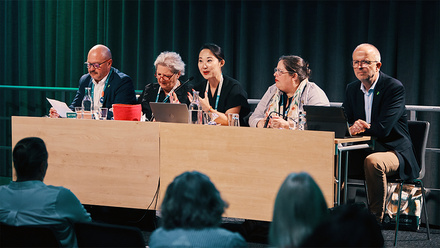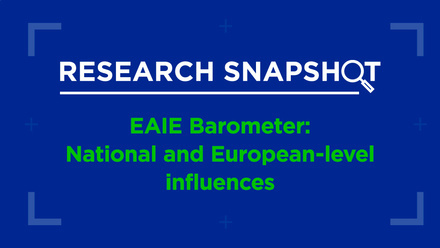3 steps to influencing policy development

In light of the current disruptions of COVID-19, together with many rapid changes and a growing relevance of internationalisation in higher education worldwide, we are all eager to influence policy developments. Despite the many barriers and uncertainties, the good news is that there are indeed ways that we can influence these processes that have such a strong impact on our everyday institutional realities.
From pro-actively exploring and clearly defining a policy problem to effectively implementing policy change, this case study from Groningen University in the Netherlands illustrates in three steps how we can respond to developments with internationalisation and influence policy processes in our national contexts. This blog post will explain how context is relevant and advise how you can exert your own agency in policy processes.
A changing national context
In higher education in the Netherlands, we have seen a rapid growth in English-taught programmes and international students and staff, trends which have to some extent been accompanied by an increased focus on internationalisation in institutional strategies and policies. At the same time, we have witnessed growing criticism of internationalisation in the national political debate.
In the Netherlands, internationalisation is perceived by some political parties and academics as a threat to the preservation of the national language and culture, and to the accessibility of higher education for domestic students. These concerns have led to a proposed new law containing stricter rules for the use of English as a language of instruction in programmes, plus a required proficiency of Dutch as well as a stricter selection for international students. If this law is accepted by a new Dutch government after the upcoming elections, this could seriously threaten the continuation of many English-taught programmes and limit opportunities for international students to study in the Netherlands.
To understand this notable shift in national policy, you should know that we have a ‘coalition democracy’ in the Netherlands, with much debate between many different stakeholders, often resulting in compromise. Whether and how topics are placed on the agenda is a result of many parallel dynamics with political power dimensions, perceived problems and policy solutions. When these competing interests coincide, a ‘policy window’ appears as an ideal opportunity for a limited period of time to put a topic on the agenda.
Currently, right-wing political parties have a majority in the Dutch parliament. In addition, a small group of academics has expressed their concerns aloud in the media and thereby influenced the public debate. This has created an ideal policy window to put international students and English-taught programmes on the national political agenda as a problem, resulting in this proposed law for a more restrictive selection and language policy, with more national control.
A pro-active institutional response
In the meantime, Dutch universities have been resisting this attempt for more national control and what they perceive to be a rather negative, limited approach to internationalisation. Building on an institutional dual language and culture policy established in 2014, the University of Groningen values the parallel existence of Dutch and English-taught programmes and stresses the interrelatedness of language and intercultural skills. The problem experienced in Groningen is not the number of international students or English-taught programmes as such, but the implications in terms of capacity and workload, as well as in language, intercultural, didactic and managerial skills that are necessitated by increased internationalisation. In line with this policy, the university approaches selection of students with restraint, while optional Dutch language courses are offered to international students and staff, along with courses in English and intercultural competences, and specific didactic and management training according to specific needs and requirements. This tailor-made support is building on insights and resources from the recently-completed institutional projects on language and culture, the international classroom and the EU project EQUIIP.
The next challenge is to update and add on to the 2014 policy. Each faculty, programme and department needs to develop a plan to make internationalisation, diversity and inclusiveness effective and meaningful in their specific context and specify the conditions and resources required to do so. The current start of the next five-year strategic period is expected to create an ideal institutional policy window for effective implementation. At the same time, this will be an adequate response to the expected stricter rules from the national government.
Influencing policy: 3 key steps
This takes us back to our key question of how to influence policy development in such a context. This process can be approached in three steps; throughout this process, you need to be proactive in developing and maintaining your networks with stakeholders in different roles, networks and organisations.
1. Exploring and defining the problem
Whose problem is it? How urgent is the problem? What are the underlying rationales and the different perspectives? Is there a better alternative to policy development? You can influence by being aware and informed about relevant developments, factors and actors, such as financial aspects, political dimensions and public opinion. The way you define the problem impacts whether policies need to be developed or adjusted and how this should be done.
2. Policy development
Write or cooperate in developing a SMART proposal with specific goals reflected in intended impact and outcomes. With the evidence of what has been achieved and learned already, gathered in the first phase, you can substantiate your proposal.
3. Effective implementation
With your SMART policy proposal, make sure to include a plan with key actors and resources to ensure effective implementation. Mapping backwards from your intended impact and outcomes, develop indicators to monitor and evaluate the process and outcomes.
We need to maximise our influence in order to make a meaningful contribution
With rapid changes and much uncertainty in national and institutional contexts, we need to maximise our influence in order to make a meaningful contribution. The University of Groningen is demonstrating this point with its nimble institutional policy response to shifting national policies. These insights should help you in finding the best ways in which you can exert your agency and influence policy developments in your own context.






